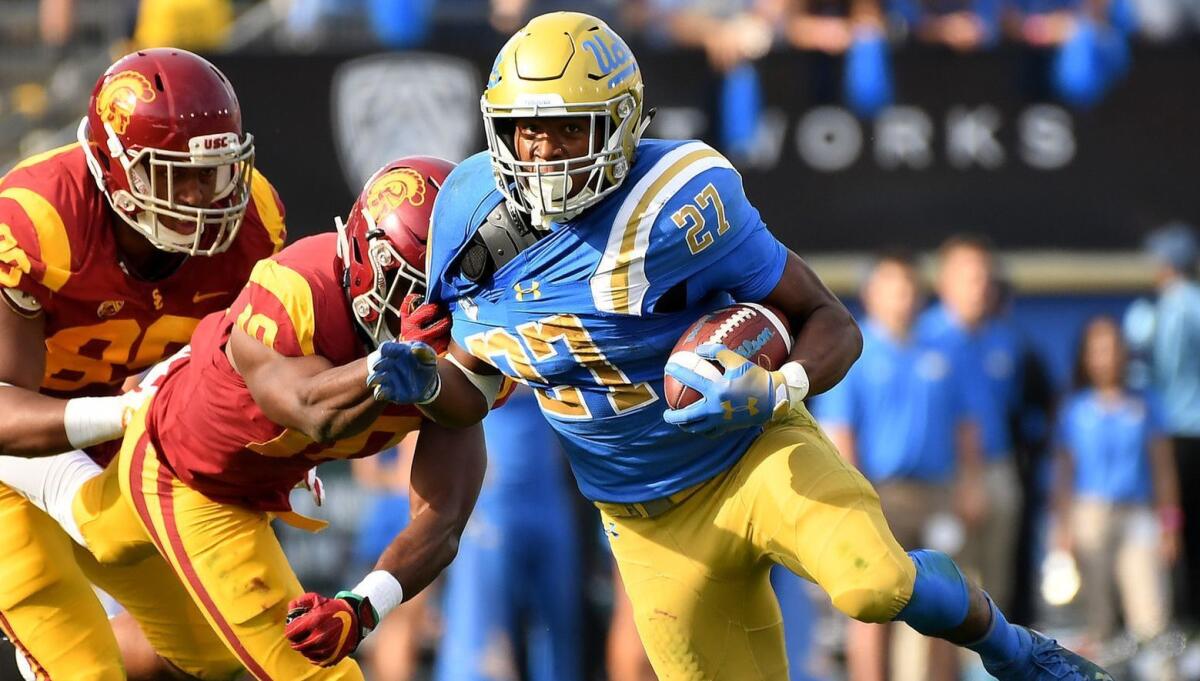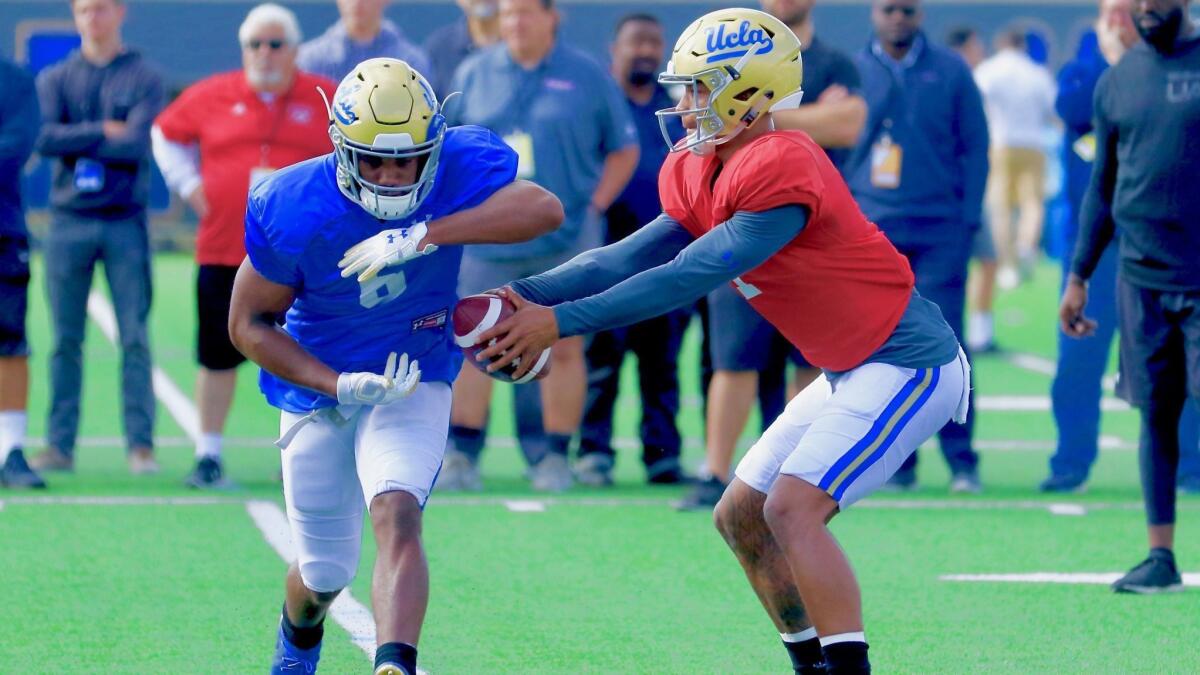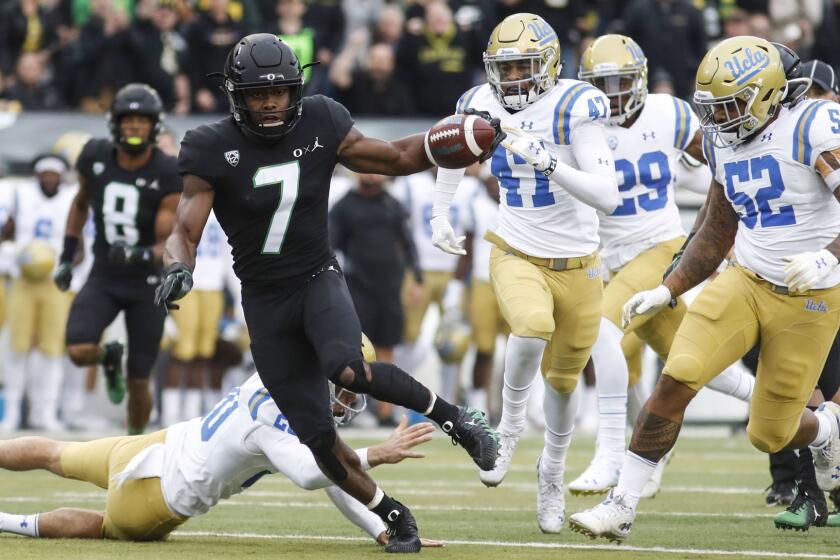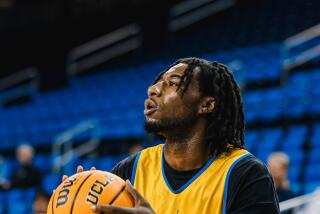UCLA hopes a fondness for chess will help checkmate the competition

- Share via
Joshua Kelley anticipated his move as he studied the game footage. The linebackers plugged the openings created by the offensive line, producing a conundrum for the running back.
Should he cut outside? Crash into the middle of the line? Charge toward a hole that hadn’t materialized?
Kelley, UCLA’s star tailback, felt as if he knew what to do because he was accustomed to thinking ahead.
He had spent hours doing it with his pawns, bishops and knights.
Kelley and the Bruins are using chess as a means to make smart, snappy decisions that they hope will make them appear a step ahead of their opponent when they open the season against Cincinnati on Aug. 29.
“I feel like if you simplify it that way,” Kelley said recently of the team’s new pursuit, “it’s kind of like you’re not reacting, you’re just anticipating.”
Constantly in search of an edge, UCLA coach Chip Kelly brought in mind-set strategist Seth Makowsky at the start of spring practice to teach chess to the players. It was intended as more than a leisurely pursuit, meant to enhance analytical skills and problem-solving abilities.
Under assistant coach Derek Sage, the Bruins have simplified their approach on special teams while also giving that facet of the game more focus.
“It’s just an opportunity to kind of expand how they think and what they do,” Kelly said. “And it’s a fun thing to do. Probably better than playing video games.”
The chess was originally targeted for UCLA’s quarterbacks but became a nearly team-wide endeavor after cornerback Darnay Holmes butted in as only he can.
“Darnay being Darnay,” quarterback Austin Burton said, “[he] was like, ‘I want in on that.’ ”
Defensive backs, running backs and offensive linemen are among those who have partaken. Makowsky posted on social media several pictures of Bruins staring at a chess board while contemplating their next move. An accompanying video shows Holmes explaining the importance of developing the discipline to envision things unfolding on the chess board as well as on the field.
The game has sparked an ongoing debate about who’s the best player on the team.
“That is to be determined,” quarterback Dorian Thompson-Robinson said, “based on who you ask.”

It probably isn’t right tackle Jake Burton, who acknowledged losing to quarterback Colson Yankoff “in like five moves.”
Quarterback Chase Griffin listed himself and guard Sam Marrazzo as the team’s chess masters, but Thompson-Robinson noted that he defeated Griffin, a veteran of the game, despite being a chess rookie.
Further muddling matters, Burton said that he “killed” Thompson-Robinson.
Makowsky declined to speak with The Times for this story but told Reuters this summer that playing chess provided high-level athletes with a competitive advantage.
“Everyone is super physically gifted,” Makowsky told the news service, “but what begins to separate the elite top performers is how they process things, their mind-set, their mentality, how they can recognize patterns, how they can almost see five moves ahead.”
Makowsky, who has worked with Houston Texans quarterback Deshaun Watson and several Olympians, said what’s important is not the chess but how it applies to the principles of whatever sport the athletes play.
“Chess is just a vehicle for my training; it is equal if they understand it or they don’t,” Makowsky told Reuters. “Even better if they don’t because what we are focused on is not necessarily chess itself. [It’s] how to ascertain moves in a certain order, how to value certain pieces, how to go through a certain decision-making process.”
Griffin said he has noticed that as he improved in chess, he improved in football. It probably helps that the thought process is similar in both endeavors.
College admissions scandal: A $100,000 bribe and help from Rick Singer got him a soccer scholarship to UCLA. But he didn’t play.
“Each piece or each move,” Burton said, “you’ve got to calculate it because you’ve got to see where you’re being attacked and where you’re attacking someone. So when I’m on the field, it’s kind of the same thing — where am I being attacked? Where am I getting blitzed?
“If they’re rotating, someone’s coming in, that’s where I’m being attacked. And where am I attacking, kind of where is the play going toward? Is it outside run? Is it a pass play? Is it Cover 1, Cover 2? Kind of where are we trying to get the ball to?”
The benefits of the game have varied. Holmes said it has helped him relax and not fear failure. Kelley said it has made him see football in an entirely new way.
The hope is that the new pursuit leads to new results for a team coming off three consecutive losing seasons.
“The way that we work it and the way we think about it and the way we talk through our moves,” Griffin said, “it really translates out to the field.”
More to Read
Go beyond the scoreboard
Get the latest on L.A.'s teams in the daily Sports Report newsletter.
You may occasionally receive promotional content from the Los Angeles Times.








